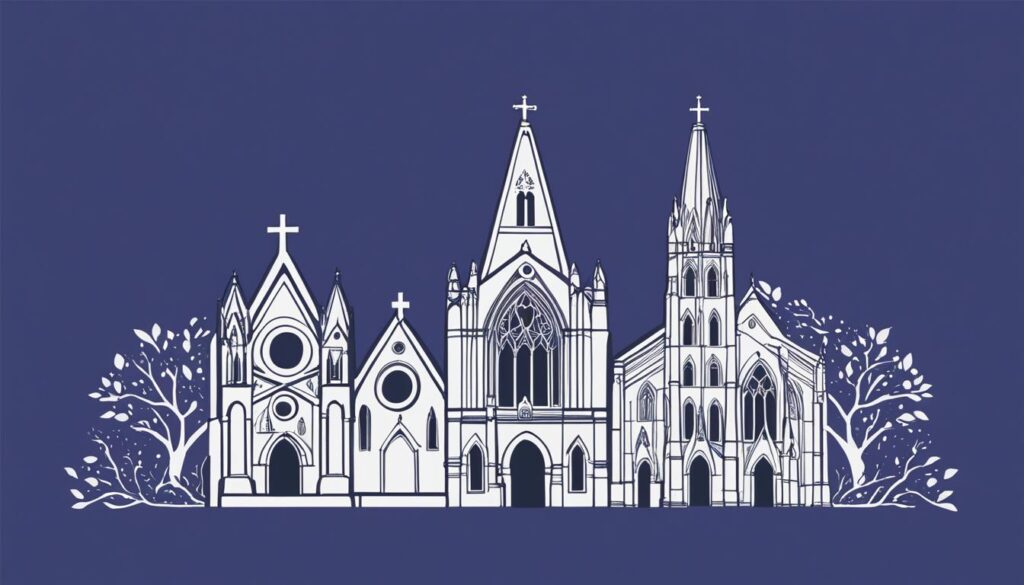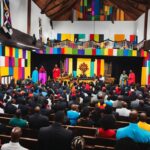The Uniting Church in Australia is a prominent Christian denomination and religious organization that was established on June 22, 1977. It emerged through the merger of the Methodist Church of Australasia, the Presbyterian Church of Australia, and the Congregational Union of Australia. With approximately 243,000 members in 2018, the Uniting Church is deeply rooted in the Australian religious landscape.
This Christian denomination has a rich history and a strong commitment to social justice, community outreach, and spiritual growth. It draws inspiration from its diverse origins and embraces a combination of Calvinist and Methodist beliefs and doctrines.
Key Takeaways:
- The Uniting Church in Australia was established in 1977 through the merger of the Methodist Church of Australasia, the Presbyterian Church of Australia, and the Congregational Union of Australia.
- With approximately 243,000 members in 2018, the Uniting Church is a significant Christian denomination in Australia.
- The Uniting Church upholds a combination of Calvinist and Methodist beliefs and doctrines.
- It recognizes Baptism and the Lord’s Supper as its two sacraments.
- Leadership in the Uniting Church is primarily undertaken by ordained ministers, without the presence of bishops.
The Uniting Church in Australia places great emphasis on worship practices that foster a sense of community, spiritual growth, and connection with God. The Bible serves as its primary sacred text, and the denomination actively engages in dialogue and collaboration with other Christian churches and organizations.
Furthermore, the Uniting Church is deeply committed to social justice and community outreach. It operates numerous agencies and institutions that provide essential services to the community, including aged care, hospitals, support for children and families, disability support, and employment assistance.
As the Uniting Church continues to evolve and face contemporary issues and challenges, it remains dedicated to its mission of inclusivity, justice, and the pursuit of a more compassionate society.
Origins and Merger
The Uniting Church in Australia traces its roots to a significant merger that took place on June 22, 1977. This momentous event brought together three distinct Christian denominations: the Methodist Church of Australasia, the Presbyterian Church of Australia, and the Congregational Union of Australia. Under the Basis of Union, the majority of congregations from the Methodist Church, around two-thirds of the Presbyterian Church, and almost all the churches of the Congregational Union united to form the Uniting Church.
With this merger, the Uniting Church was born, marking a new chapter for Christianity in Australia. The consolidation of these denominations was motivated by a desire for unity and a shared vision of serving God and the community.

This image visually represents the coming together of these three denominations to form the Uniting Church. It symbolizes the unity, strength, and shared purpose that has characterized the Uniting Church since its inception.
By joining forces, the Uniting Church aimed to combine the strengths and resources of these three denominations, fostering a more cohesive and impactful Christian presence in Australia. This historic merger solidified the Uniting Church’s commitment to inclusivity, diversity, and social justice, shaping the denomination’s values and priorities for years to come.
Beliefs and Doctrines
The Uniting Church in Australia is rooted in a unique blend of Calvinism and Methodism, encompassing a rich tradition of Christian faith and religious beliefs. At the core of its teachings is the affirmation of the triune nature of God, emphasizing the divine unity of the Father, the Son (Jesus Christ), and the Holy Spirit.
The Uniting Church acknowledges Jesus Christ as both fully divine and fully human, acknowledging his redemptive role in the salvation of humanity. It teaches that salvation comes through faith, emphasizing the importance of personal belief in Jesus Christ as the Son of God and the savior of the world.
The authority of Scripture is highly regarded in the Uniting Church, recognizing the Bible as a sacred text inspired by God and fundamental to Christian living and doctrine. It is through the study and interpretation of the Scriptures that believers gain spiritual guidance and understanding.
The Uniting Church also emphasizes the guidance and presence of the Holy Spirit in the life of believers. The Holy Spirit enables spiritual growth, personal transformation, and the discernment of God’s will in individual and communal settings. It is through the Holy Spirit that believers are empowered to live out their faith and carry out the mission of the Church.
Central to the beliefs and doctrines of the Uniting Church is the commitment to social justice, diversity, and inclusive love. The Church advocates for fairness, equality, and compassion, working actively towards addressing societal issues and promoting the well-being of all individuals.
Through its teachings, the Uniting Church seeks to inspire believers to live out their faith in practical ways, cultivating a deep sense of compassion and acceptance towards others. It welcomes all people, regardless of their background or circumstances, inviting them to experience the transformative power of God’s love within the context of a vibrant faith community.

Key Beliefs and Doctrines of the Uniting Church in Australia:
- Belief in the triune nature of God – Father, Son (Jesus Christ), and Holy Spirit
- Affirmation of the divinity and humanity of Jesus Christ
- Salvation through faith in Jesus Christ
- Recognition of the authority of Scripture
- Guidance and empowerment through the Holy Spirit
- Commitment to social justice, diversity, and inclusive love
Sacraments and Rituals
The Uniting Church recognizes two sacraments: Baptism and the Lord’s Supper (Holy Communion). These sacraments hold great significance in the Uniting Church’s worship and spiritual practices.
Baptism is seen as a response to God’s grace and an initiation into the Christian community. Through the act of baptism, individuals publicly declare their faith and commitment to Christ. It is a symbolic representation of dying to sin and being reborn in Christ. Baptism is performed by immersion, pouring, or sprinkling depending on the individual’s preference and theological understanding.

The Lord’s Supper, also known as Holy Communion or the Eucharist, is a sacred ritual that commemorates Jesus’ Last Supper with his disciples. It involves the sharing of bread and wine, symbolizing Christ’s body and blood. The Uniting Church practices an open and inclusive communion, inviting all baptized Christians to participate regardless of their denominational background. The Lord’s Supper is regularly celebrated during worship services, creating a space for believers to remember Christ’s sacrifice and experience spiritual nourishment.
While Baptism and the Lord’s Supper are recognized as the two primary sacraments in the Uniting Church, other rituals and practices may vary among congregations. These may include prayers, hymns, readings from sacred texts such as the Bible, and personal reflections. The Uniting Church values the diversity of worship expressions and encourages individuals to engage in meaningful rituals and practices that deepen their faith and spiritual connection.
Rituals and Practices in the Uniting Church
Within the Uniting Church, there is flexibility in the interpretation and implementation of rituals and practices. Congregations have the autonomy to incorporate various elements into their worship services, reflecting their unique cultural and theological perspectives. Some common rituals and practices include:
- Meditation and silence for individual reflection and spiritual contemplation.
- Worship through music, including hymns, contemporary songs, and instrumental performances.
- Liturgical readings and responsive prayers that engage the congregation in active participation.
- Sacred dance and movement as expressions of worship and spiritual expression.
- Dramatic interpretations of biblical stories or parables to enhance understanding and engagement.
- Feasting and fellowship as a way to celebrate community and strengthen relationships.
These rituals and practices contribute to creating a rich and vibrant worship experience within the Uniting Church, promoting spiritual growth, and fostering a sense of unity and belonging.
“Through sacraments and rituals, the Uniting Church provides spaces for individuals to encounter the divine, embrace spirituality, and deepen their connection with God and the Christian community.”
Leadership and Clergy
The Uniting Church follows a non-episcopal polity and does not have bishops. Instead, leadership and pastoral roles are primarily performed by ordained ministers, who are appointed by presbyteries and synods within the denomination. The Uniting Church places a strong emphasis on recognizing the gifts and talents of both ordained ministers and lay members, encouraging active involvement in the ministry and decision-making processes. This collaborative approach promotes a sense of ownership and shared responsibility within the faith community.
The President of the Assembly holds the highest governing position in the Uniting Church and plays a significant leadership role in guiding and representing the denomination. The President, elected by the members of the Assembly, serves as the spokesperson for the Uniting Church and provides direction in matters of faith, doctrine, and social justice.
The Role of Ordained Ministers
Ordained ministers in the Uniting Church play a vital role in providing spiritual guidance, leading worship services, and administering sacraments to the congregation. They are responsible for preaching sermons, conducting baptisms, and presiding over the Lord’s Supper. These ministers undergo rigorous theological education and training to equip them for their pastoral responsibilities.
“The call to ministry is a sacred calling, requiring dedication, compassion, and a deep-rooted faith in the teachings of Christ. It is a privilege and a responsibility to serve as ordained clergy in the Uniting Church, guiding and nurturing the faith community as we strive to live out the values of love, justice, and inclusivity.”
Lay Leadership and Involvement
The Uniting Church recognizes the importance of lay leadership and encourages the active participation of lay members in the life of the church. Lay leaders may be involved in various roles, including worship leading, pastoral care, outreach programs, and social justice advocacy. Their valuable contributions enrich the ministry and foster a sense of belonging and ownership within the faith community.
“The Uniting Church values the unique gifts and perspectives that each member brings, empowering lay leaders to use their talents to make a positive impact on the lives of others. Together, we work towards building a compassionate and inclusive community that reflects Christ’s teachings and embodies the values of the Uniting Church.”
| Role | Responsibilities |
|---|---|
| Ordained Ministers | Leading worship services, providing pastoral care, administering sacraments, preaching sermons |
| Lay Leaders | Worship leading, pastoral care, outreach programs, social justice advocacy |

Worship Practices
In the Uniting Church, worship practices vary across congregations, creating a diverse tapestry of spiritual expressions within the worship community. While each congregation may have its unique traditions and styles, the core elements of a typical church service in the Uniting Church often include:
- Prayers: Both communal and individual prayers are an integral part of worship, offering a direct connection to God and a means for expressing gratitude, seeking guidance, and lifting up the needs of the community.
- Hymns: The congregation joins together in singing hymns, which serve as expressions of praise, reflections on faith, and a way to unite hearts in worship.
- Readings from Sacred Texts: The Bible holds a central place in Uniting Church worship services, with readings drawn from the Old and New Testaments. These readings serve as a source of inspiration, teaching, and guidance.
- Sermons: Sermons are delivered by ordained ministers or guest speakers and offer reflections on the scripture readings, expounding on their meaning and relevance to the congregation’s faith journey. They provide guidance and encouragement for spiritual growth.
- Sacraments: The Uniting Church recognizes two sacraments – Baptism and the Lord’s Supper (Holy Communion). Through Baptism, individuals are initiated into the Christian community, and the Lord’s Supper allows for a communal remembrance of Jesus’ Last Supper, affirming the participant’s connection to Christ and fellow believers.
These various elements of worship are designed to foster a sense of community, create a space for spiritual growth, and nurture a profound connection with God. Whether through heartfelt prayers, uplifting hymns, insightful sermons, or the sharing of sacraments, the Uniting Church seeks to provide a meaningful and transformative worship experience for its members.

| Element | Description |
|---|---|
| Prayers | Offering direct communication with God, expressing gratitude, seeking guidance, and uplifting the needs of the community. |
| Hymns | Joining together in song to offer praise, reflect on faith, and unite hearts in worship. |
| Readings from Sacred Texts | Drawn from the Bible, providing inspiration, teaching, and guidance for the congregation. |
| Sermons | Reflections on scripture, offering guidance and encouragement for spiritual growth. |
| Sacraments | Baptism and the Lord’s Supper (Holy Communion), symbolizing initiation into the community and a communal remembrance of Jesus’ Last Supper. |
Sacred Texts
At the heart of the Uniting Church in Australia lies a deep reverence for sacred texts, with the Bible serving as its primary source of authority for Christian faith and practice. The Uniting Church upholds the significance of biblical scholarship and encourages its members to engage in the study and interpretation of the Scriptures.
The Bible, comprising the Old and New Testaments, is revered as the inspired Word of God by the Uniting Church. It is believed to contain the teachings, stories, and messages that guide the faith and spiritual growth of believers. The sacred texts of the Bible are viewed as foundational to understanding the tenets of Christianity and shaping the moral and ethical values of the Uniting Church community.
In addition to the Bible, the Uniting Church draws inspiration from various theological writings, creeds, and statements of faith. These resources reflect the denomination’s evolving understanding of Christian theology and provide valuable insights into the interpretation and application of biblical principles.
“The Bible is a sacred library that reveals God’s love and plan for humanity. Its words have the power to transform lives, inspire meaningful actions, and deepen our connection with the divine.”
The Uniting Church recognizes the importance of engaging with sacred texts in a thoughtful and critical manner. It encourages open dialogue, intellectual exploration, and the integration of different perspectives within the context of biblical interpretation. Through studying and reflecting on these sacred texts, church members are encouraged to deepen their faith, grow spiritually, and live out their Christian convictions with compassion and integrity.
Key Beliefs from Sacred Texts
- The belief in the triune nature of God: Father, Son, and Holy Spirit.
- The divinity and humanity of Jesus Christ as the Son of God and Savior of humanity.
- The importance of salvation through faith in Jesus Christ.
- The authority and relevance of the Scriptures in guiding the church’s beliefs and practices.
- The role of the Holy Spirit in guiding and empowering believers.
Denominations and Sects
The Uniting Church is its own distinct denomination and does not have separate denominations or sects within its structure. However, it maintains ecumenical relationships and partnerships with other Christian churches and organizations. The Uniting Church actively engages in dialogue and collaboration with other denominations, including the Anglican Church and Lutheran Church, to promote unity and cooperation within the broader Christian community.
“We are all one body, we have the same Spirit, and we have all been called to the same glorious future.” – Ephesians 4:4
In its commitment to unity and collaboration, the Uniting Church seeks to foster a sense of shared purpose and common identity among different Christian denominations. By transcending denominational boundaries, the church aims to create a stronger collective voice for justice, compassion, and spiritual growth.
Through ongoing dialogues, interfaith initiatives, and joint projects, the Uniting Church demonstrates its dedication to building bridges and forming deep connections with other Christian communities. By engaging in dialogue and cooperation, the church seeks to grow in understanding, learn from diverse perspectives, and strengthen the bonds of fellowship among believers.
Ecumenical Relationships
The Uniting Church actively participates in ecumenical bodies such as the National Council of Churches in Australia (NCCA) and the World Council of Churches (WCC). These organizations provide platforms for dialogue, collaboration, and joint advocacy on global and local issues of common concern.
Through these partnerships, the Uniting Church contributes to conversations and actions addressing social justice, peace, reconciliation, and ecological stewardship. By working together with other denominations, the Uniting Church extends its reach and impact beyond its own congregations, amplifying its witness and embodying the spirit of Christian unity.
“May God, who gives this patience and encouragement, help you live in complete harmony with each other, as is fitting for followers of Christ Jesus.” – Romans 15:5
This commitment to unity does not diminish the unique identity and purpose of the Uniting Church. Rather, it enhances the church’s mission by fostering dialogue, learning, and collaboration that enrich the spiritual lives of its members and the wider Christian community.
Community and Outreach
The Uniting Church is a beacon of hope and compassion, deeply rooted in its commitment to social justice and community outreach. Guided by its faith, the Uniting Church operates a vast network of agencies and institutions that provide essential community and health services throughout Australia.
From aged care facilities to hospitals, from support for children, youth, and families to disability support and employment assistance, the Uniting Church is a cornerstone of support for individuals and families in need. No matter the challenge, the Uniting Church is dedicated to serving the most vulnerable members of society, offering a helping hand and a comforting presence.
In addition to their direct services, the Uniting Church actively engages in advocacy for social issues, championing causes that promote equality, justice, and inclusivity. By working towards creating a more just and inclusive society, the Uniting Church strives to bring hope to the marginalized and disadvantaged, fostering a sense of community and empowering individuals to transform their lives.
FAQ
When was the Uniting Church in Australia established?
The Uniting Church in Australia was established on June 22, 1977.
What denominations were merged to create the Uniting Church?
The Uniting Church was formed through the merger of the Methodist Church of Australasia, the Presbyterian Church of Australia, and the Congregational Union of Australia.
What are the beliefs and doctrines of the Uniting Church?
The Uniting Church in Australia holds to a combination of Calvinism and Methodism in its beliefs and doctrines. It affirms the triune nature of God, the divinity and humanity of Jesus Christ, salvation through faith, the authority of Scripture, and the guidance of the Holy Spirit.
What sacraments and rituals are recognized by the Uniting Church?
The Uniting Church recognizes two sacraments: Baptism and the Lord’s Supper (Holy Communion). Other rituals and practices may vary among congregations but often include prayers, hymns, readings from sacred texts, and personal reflections.
Who are the leaders and clergy in the Uniting Church?
The Uniting Church follows a non-episcopal polity and does not have bishops. Leadership and pastoral roles are primarily performed by ordained ministers, who are appointed by presbyteries and synods. Lay members are also actively involved in the ministry and decision-making processes.
What are the worship practices in the Uniting Church?
Worship practices can vary between congregations but generally include a combination of prayers, hymns, readings from sacred texts, sermons, and communal participation in sacraments like Baptism and the Lord’s Supper.
What are the sacred texts recognized by the Uniting Church?
The Uniting Church regards the Bible as the primary sacred text and source of authority for Christian faith and practice. It also draws inspiration from various theological writings, creeds, and statements of faith.
Does the Uniting Church have separate denominations or sects within its structure?
The Uniting Church is its own distinct denomination and does not have separate denominations or sects within its structure. However, it maintains ecumenical relationships and partnerships with other Christian churches and organizations.
What community and outreach initiatives does the Uniting Church undertake?
The Uniting Church is committed to social justice and community outreach. It operates a vast network of agencies and institutions that provide community and health services throughout Australia. These services include aged care, hospitals, support for children, youth and families, disability support, employment assistance, emergency relief, and more. The Uniting Church also actively engages in advocacy for social issues and works towards creating a more just and inclusive society.
















